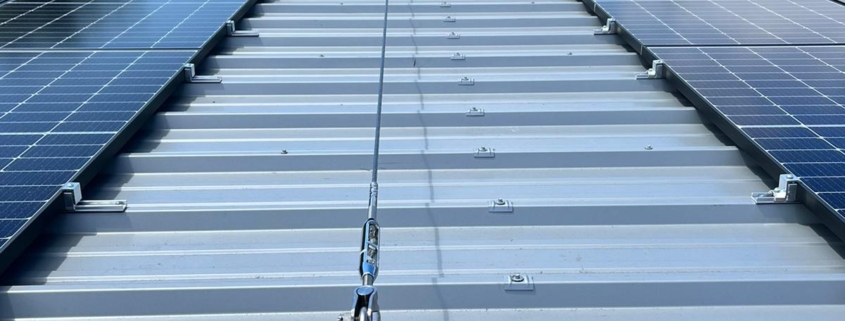Retrofit benefits to business
The economic benefits of retrofitting solar panels on your commercial building
Solar photovoltaic (PV) technology has been around for some time, with many businesses and households turning to solar energy amid a climate crisis and soaring energy prices.
A lot has been said about the benefits of solar panels for new builds, yet somehow their potential to make existing commercial buildings more cost- and energy-efficient has been overlooked.
The initial investment for a solar PV system might be seen as a barrier but the average payback of 4-6 years plus the proven annual cost-savings of 40-80% make for a compelling business case with a net positive outcome.
In this article, we break down the economic benefits of retrofitting commercial solar PV – and show why owners of manufacturing plants, warehouses and distribution centres should harness them now to protect cash flow from spiralling energy bills.
With great solar power comes great profitability
Put simply, there are two ways in which generating your solar energy contributes to business success. First, it unlocks vast savings just by avoiding retail price fluctuations and second, it allows you to sell any unused energy back into the grid. A 2022 independent report by the UK Warehousing Association states that avoiding retail energy costs is typically 2-3 times more valuable than exporting power.
By engaging an expert service provider like SQ4S, businesses can get super accurate calculations to ensure they are self-consuming over 95% of the solar power they generate, leading to savings of hundreds of thousands of pounds over the lifespan of their solar panels.
In fact, in the report, the UKWA estimates potential savings of £3bn a year for the industry from retrofitting solar PV.
Solar panels require very little maintenance and good quality ones have a long lifespan of around 25-30 years – so even taking into account maintenance and depreciation costs, most solar PV systems will pay for themselves in 4 to 6 years of usage.
So how does a provider ensure a bespoke, lean system with minimal over-production?
To calculate the size of the system, best practice is to look at current energy use known as half-hourly consumption data. At SQ4S, we have a collaborative approach and work with building owners to understand their aims and offer the most appropriate solution – and we do this completely free of charge before a commitment is made.
Upgrading commercial buildings with solar PV requires specialist knowledge in commercial installations – so feel free to give SQ4S a call today if you have any questions – we’ll be happy to help.
Greater control of costs thanks to fixed prices
Self-generating a portion of electricity allows a business to have greater control of its energy costs and benefit from paying a predictable price. Installing a solar PV system essentially means buying your energy in advance at a fixed price, often 4-5 times lower than retail since you’ve already paid for the system.
If you own an energy-intensive manufacturing or distribution centre and you don’t have solar, you’re leaving money on the table
As with most things, the more you use it, the quicker it pays for itself. The same rings true for solar PV systems: the bigger a solar PV system is and the more you use it – the greater the impact it can have on your bottom line. Hot and cold storage facilities are a perfect example of buildings that can benefit more immediately from solar.
Non-disruptive installation
Solar PV systems can be made to fit the roof type to get maximum sun rays and reduce the seasonal effects on energy production.
What’s more, the upgrade can be completed while the building remains operational, ensuring business continuity and protecting revenue.
Tax benefits and subsidies
A drive towards decarbonisation and net zero targets are pushing up inquiries for retrofit projects. With a range of grants and tax deductions, it’s the perfect time for businesses to invest in building solar capacity and get some of that money back.
To encourage investments and help businesses reach carbon neutrality, the UK Government introduced a super-deduction on capital investments, including solar panels, which has been extended and will now end in 2023.
The non-financial positives that we rarely talk about but that benefit all of us
Warehouses own nearly a third of all roof space in the UK, meaning that the warehousing sector alone can deliver the entire requirement for the UK’s renewable energy goals by 2030. Turning existing rooftops into energy-generating systems could double the UK’s solar power capacity, reduce our reliance on retail suppliers and put money back into the economy.
What does this mean for businesses and landlords?
Businesses and landlords adopting solar PV technology for their manufacturing and warehousing centres can more easily meet various standards:
- Environmental, social and governance (ESG) targets
- Energy efficiency regulations and performance standards
- Decarbonisation and net zero targets
But having solar power capacity is more than a box-ticking exercise. It’s a differentiator that sets you apart from the competition.
In a market dynamic where businesses leverage their supply chains as a strategic asset, higher energy-efficiency ratings make you more attractive to potential customers and tenants. Reducing your carbon footprint increases the present-day value of your warehouse as it helps your customers meet their own requirements.
Sustainable initiatives like fitting a solar PV system can boost your reputation as a corporate citizen
Due to their proximity to urban and sub-urban areas, warehouses are uniquely placed to power local businesses and communities with renewable solar electricity – making them a reliable partner to local government and businesses.
How to get started
The climate is favourable now to invest in solar, and you don’t have to navigate the landscape on your own.
Applying for a grid connection permit with your local DNO (Distribution Network Operator) can be challenging and lengthy, especially when you haven’t done it before.
Choosing an expert partner who will handle the project for you is the key first step to becoming more energy independent and saving your business a lot of money.
If you’re ready to take control of your energy costs with solar, you can book a free site visit with one of our experts. We’ll assess your needs and provide specific recommendations free of charge.




